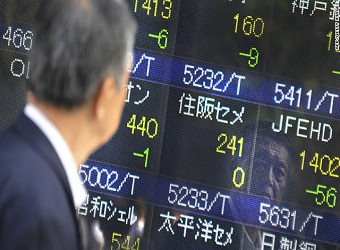Asia markets traded mixed on Tuesday as most major exchanges outside of Tokyo resumed after being shut for a public holiday on Monday.
The Reserve Bank of Australia (RBA) kept its benchmark cash rate unchanged at a record low of 1.5 percent, largely in line with market expectations. Governor Philip Lowe said in the policy statement that conditions in the house market continue to vary considerable around the country.
“There’s currently no monetary policy bias built into the RBA futures curve for this year, with less than 2 basis points of easing “priced in” by December, an understandable less than 10 percent chance of a cut,” said David de Garis, director of economics at the National Australia Bank, in a note before the RBA’s decision.
The Australian dollar traded as high as $0.7555 after the decision, before easing slightly to $0.7544 at 1:01 p.m. HK/SIN. The Aussie climbed from levels below $0.7500 on Monday.
In the equity market, the benchmark ASX 200 traded down 0.26 percent, with the heavily-weighted financial sector down 1.01 percent.
Japan’s Nikkei 225 climbed 0.68 percent in afternoon trade, while the Topix index was up 0.73 percent. Across the Korean Strait, the Kospi was up by 0.82 percent. In Hong Kong, the Hang Seng index rose 0.21 percent and Singapore’s STI was up 0.83 percent.
Chinese mainland markets traded lower, where the Shanghai composite was down 0.23 percent and the Shenzhen composite was near flat.
Bank earnings were also on investors’ radar today.
The Australia and New Zealand Banking Group (ANZ), one of the country’s so-called Big Four banks, reported 2017 half year results before market open. ANZ said its cash profit for rose 23 percent to 3.41 billion Australian dollars ($2.57 billion) in the six months ended March 31, 2017.
ANZ shares dropped 2.22 percent in afternoon trade. The other major Australian banks also fell; shares of Commonwealth Bank dropped 0.94 percent, Westpac was down 1.27 percent and the National Australia Bank was lower by 0.54 percent.
Meanwhile, Singapore’s top lender DBS Group reported first quarter net interest income came in nearly flat at 1.831 billion Singapore dollars ($1.31 billion), down slightly from S$1.833 billion a year ago. DBS shares rose 2.27 percent, while competitors OCBC also rose 1.53 percent and UOB was up by 3.26 percent.
In the currency market, the dollar index, which measures the greenback against a basket of currencies, traded at 99.04, climbing from levels near 98.88 in the previous session.
With the Federal Open Market Committee set to begin a two-day policy meeting later in the global day, the outcome is “not expected to yield any significant change in terms of policy stance,” said Wei Liang Chang, a foreign exchange strategist at Mizuho Bank, in a note.
Chang added the dollar could see seasonal strength in May, “perhaps helped by risk paring given the “sell in May” adage, and also the fading of Q1 U.S. data weakness into strength, which has recurred consistently in recent years.”
Among currency majors, the yen traded at 111.90. Major Japanese exporters were mixed, with Toyota gaining 1.42 percent, Nissan up 1.03 percent and Mitsubishi Electric was down 0.28 percent.
Elsewhere, the euro fetched $1.0913.
Meanwhile, oil prices retreated on Tuesday during Asian hours. U.S. crude price was down 0.41 percent at $48.64, after declining one percent on Monday. Price for global benchmark Brent fell 0.29 percent to $51.37 at 1:11 p.m. HK/SIN.
Source: CNBC


